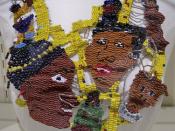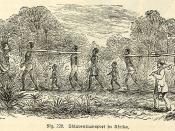The Hubris of Albion
"Beware prejudices. They are like rats, and men's minds are like traps; prejudices get in easily, but it is doubtful if they ever get out."
Lord Jeffery
For as many years as America and Europe have sought repentance for their atrocities to Africa, we have also searched the annals of history to find how such a thing as slavery or concept as racial superiority could ever thrive in modern civilization. We have debated for ages whether our notion of supremacy was the crucible for slave trade, or merely its by-product. It is this fledgling historian's view that neither was the catalyst for the other; rather, they were mutually beneficial perceptions. An overwhelming number of people uprooted and placed in an role of servitude spawned new levels of ethnocentricity, while racism and culture-shock became the philosopher's prime rationale to alleviate labor shortages and economic downturn the easiest way possible.
In other words, without one, the other concept was vulnerable to skeptics and dissention of the day, while together they comforted the consciences of seventeenth and eighteenth century white men.
During the Elizabethan age, English ethnocentricity and national pride reached a zenith. Truly, the Queen herself was, "its very embodiment: her cheeks were 'two roses in a bed of lilies.'" When explorers of the country finally traveled to the southern parts of Africa, they were, in a word, shocked. Their descriptions of these Sub-Saharan cultures were no less vivid:
And entering in, we see
A number of blacke soules,
Whose likelinesse seem'd men to be
But all as blacke as coles.
Their Captain comes to me
As naked as a naile,
Not having witte or honestie
To cover once his taile.
However, this poem lets on to more than the mere initial reaction of whites to...


